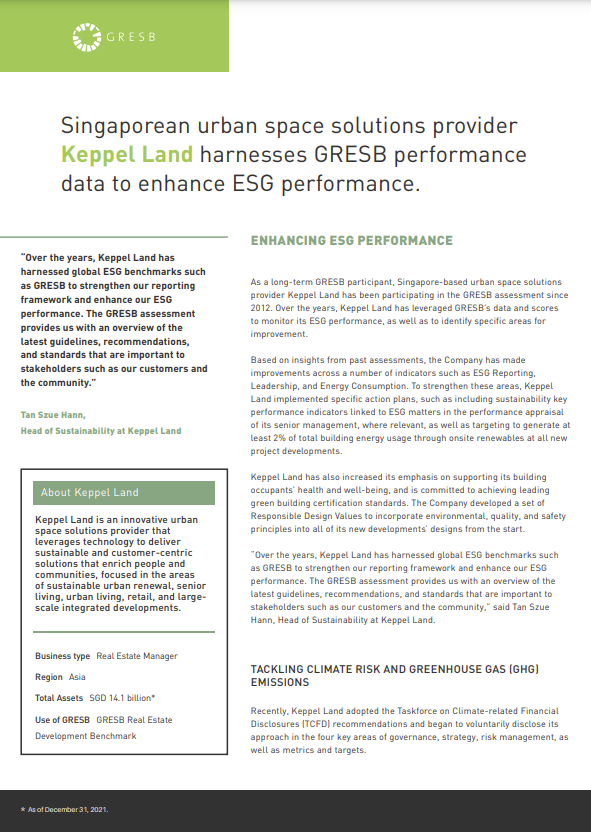Singaporean urban space solutions provider Keppel Land harnesses GRESB performance data to enhance ESG performance.

Keppel Land is an innovative urban space solutions provider that leverages technology to deliver sustainable and customer-centric solutions that enrich people and communities, focused in the areas of sustainable urban renewal, senior living, urban living, retail, and largescale integrated developments.
Business type: Real Estate Manager
Region: Asia
Total Assets: SGD 14.1 billion (as of December 31, 2021)
Use of GRESB: GRESB Real Estate Development Benchmark
Enhancing ESG performance
As a long-term GRESB participant, Singapore-based urban space solutions provider Keppel Land has been participating in the GRESB assessment since 2012. Over the years, Keppel Land has leveraged GRESB’s data and scores to monitor its ESG performance, as well as to identify specific areas for improvement.
Based on insights from past assessments, the Company has made improvements across a number of indicators such as ESG Reporting, Leadership, and Energy Consumption. To strengthen these areas, Keppel Land implemented specific action plans, such as including sustainability key performance indicators linked to ESG matters in the performance appraisal of its senior management, where relevant, as well as targeting to generate at least 2% of total building energy usage through onsite renewables at all new project developments.
Keppel Land has also increased its emphasis on supporting its building occupants’ health and well-being, and is committed to achieving leading green building certification standards. The Company developed a set of Responsible Design Values to incorporate environmental, quality, and safety principles into all of its new developments’ designs from the start.
“Over the years, Keppel Land has harnessed global ESG benchmarks such as GRESB to strengthen our reporting framework and enhance our ESG performance. The GRESB assessment provides us with an overview of the latest guidelines, recommendations, and standards that are important to stakeholders such as our customers and the community,” said Tan Szue Hann, Head of Sustainability at Keppel Land.
Tackling climate risk and greenhouse gas (GHG) emissions
Recently, Keppel Land adopted the Taskforce on Climate-related Financial Disclosures (TCFD) recommendations and began to voluntarily disclose its approach in the four key areas of governance, strategy, risk management, as well as metrics and targets.
Keppel Land’s key assets have also been evaluated in a high-level physical risk assessment for the potential impact of climate-related hazards. Through this analysis, Keppel Land was able to identify climate-related risk (both physical and transitional) and opportunities, and develop a comprehensive
set of mitigating strategies to manage these risks.
Keppel Land is also committed to halving its absolute Scope 1 and 2 GHG emissions by 2025 from 2020’s level, and achieving net zero by 2030. It was the first company in the Asia real estate sector to set a near-term sciencebased target to reduce Scope 1 and 2 GHG emissions by 100%.
To reduce its Scope 1 and 2 emissions and achieve net zero by 2030, Keppel Land’s strategy includes phasing out the use of non-essential diesel equipment; meeting the standards of the Building and Construction Authority of Singapore’s (BCA) Green Mark scheme, or their equivalent, for all its new commercial developments; improving the energy efficiency of its existing buildings through energy optimization and digitalization strategies; maximizing on-site renewable energy, as well as purchasing renewable energy certificates.
Securing sustainable financing
Keppel Land places sustainability at the core of its strategy. This goes beyond the management of low-carbon, resource-efficient buildings, and also extends to the strengthening of its green funding sources.
To support its sustainable financing strategy, Keppel Land uses ESG metrics and benchmarks such as GRESB to secure sustainability-linked loans. Sustainability-linked loans may incorporate interest rate reductions and/or margin discounts that are linked to pre-determined ESG targets, e.g. achieving an agreed upon GRESB score and star rating in the annual GRESB Real Estate Assessment.
In 2021, Keppel Land obtained an SGD 150 million sustainability-linked loan from DBS Bank, and pegged some of the loan’s KPIs to its performance scores in the annual GRESB Assessment.
Getting started
Learn more about leveraging GRESB data and scores in your sustainable financing strategy at gresb.com/sustainability-linked-loans.